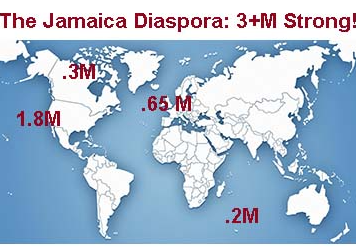
The term Diaspora describes a community of people who live outside their shared country of origin or ancestry but maintain active connections with it. A diaspora includes both emigrants and their descendants.
The Diaspora is of strategic importance to Jamaica in its quest for sustainable development. Jamaica is committed to building, strengthening and mobilizing sustainable networks of Diaspora members and Friends of Jamaica and their resources for maximizing their contributions to the economic growth and social development of Jamaica and increase Jamaica’s influence worldwide.
The Government of Jamaica (GoJ) has already taken steps towards mobilizing the Diaspora for home country development. For example, there exists a structured Diaspora movement that hosts a biennial conference in Jamaica with the goal of facilitating the growth of Jamaica’s economy and human and social development.
The contributions of the Jamaica Diaspora are wide and varied:
• Remittances represent 17% of GDP.
• Diaspora Tourism is 11-15% of visitors.
• Hundreds of Diaspora Organizations make significant contributions to Jamaica in healthcare, education, sports, business investment and trade.
• Over 200 Health Missions funded by the Diaspora provide free health care services especially in rural communities annually.
• The contributions of the Diaspora to education and healthcare amounts to nearly US$9 million over a four year period.
Diasporas can build bridges between countries of origin and countries of destination, which calls for the design of local and global strategies aiming to harness this potential. The development potential of Jamaicans abroad cannot be understated, Jamaica’s Diaspora is among the largest in the world and is estimated to be in excess of three million persons. The United States of America is the residence of more than half with approximately 1.8 million, the United Kingdom with approximately 650,000, and Canada with an estimated 300,000, with the remainder located in numerous countries across the globe. Simultaneously, with the growing number of Jamaican migrants around the world, there is a growing interest for them to retain their sense of identity and connection to home.